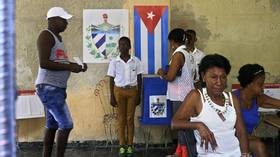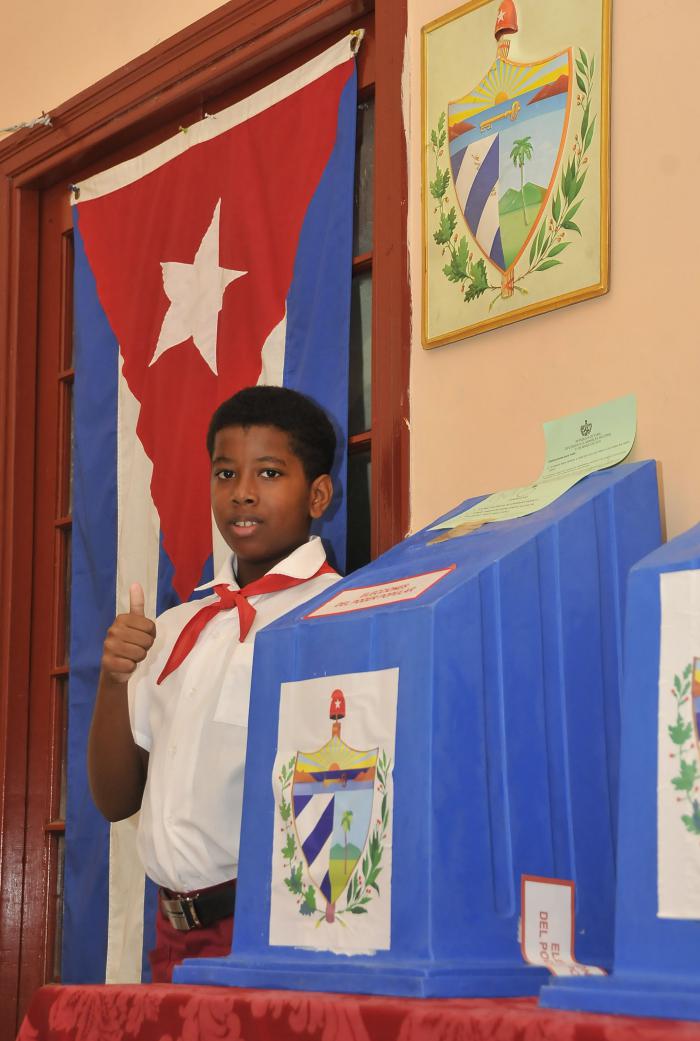Cuba snubs Trump’s anti-socialist crusade with massive constitution vote
Published time: 1 Mar, 2019 15:03

Cuba’s new Magna Carta reinforces the island’s revolutionary model, even as Washington ramps up its efforts against leftist governments in Latin America.
As Cubans lined up to cast their ballots over what is arguably the most significant reform seen by the country in half a century, US officials insisted on dismissing the vote.
“Today, through its forced constitutional referendum, the Communist Party renewed the legal pretext to deny the people of Cuba the change they desire,” Kimberly Breier, Assistant Secretary of State for Western Hemisphere Affairs,tweeted.
In a densely populated Central Havana neighborhood adjacent to the famed Malecon, Rodolfo Abram begged to differ.
“Voting isn’t mandatory, whoever wants to vote, comes of their own volition and votes,” said the 57-year-old self-employed worker. “Everyone here votes, for the yes side, for the revolution.”
Across the island, people went to the polls en masse to vote on a package of changes to the 1976 Constitution, with an overwhelming majority voting to support the new constitution.
Speaking to journalists at the International Press Center the day after the vote, Alina Balseiro Gutierrez, president of the National Electoral Commission, confirmed that voter turnout had exceeded 84 percent.
The ‘yes’ campaign obtained 90.6 percent, or roughly 6.8 million votes, compared to just over 700,000 who rejected the proposal.
Perhaps even more impressive than the turnout is the scale of the public consultation that took place after Cuban lawmakers passed an initial draft last July.
Over 130,000 meetings were held at job sites, neighborhoods, schools and universities, hospitals, and any other place people gather in order to discuss the draft and give feedback. Upwards of 800,000 proposals were then sent up to the National Assembly of People’s Power for consideration and review.
By far the most talked about point was the issue of marriage, with National Assembly member Mariela Castro leading the charge to remove language that defined marriage as being between a man and woman. Despite the push by recognized leaders including Castro and current President Miguel Diaz Canel, most of the proposals around these articles rejected the move.
The language put to a vote deferred the definition to a marriage law that will be reviewed within approximately two years.
Among the most notable political reforms were new limits to the term and age for Cuba’s head of state, who will now have to be under the age of 60 when they begin their first of a maximum of two terms.
On the economic front, the new constitution recognizes different forms of property, including private property, and also the role of the market, which Cuban leaders hope to wield the advantage of through regulation and taxation.
This would mean that Cubans will be allowed to employ other Cubans for a wage, with much fewer regulations than currently exist.
All told, 63 percent of the original draft’s articles were changed based on feedback from the Cuban people.
“All Cubans had the opportunity to give our opinions on this constitution, which comes at a very important time for our country, and which will be very important for our present and our future,“ said Nereyda Lopez Labrada, a member of the National Assembly and Secretary General of the National Union of Cultural Workers.
“This has been a total success and in total democracy.”
To characterize these changes as important is surely an understatement.
ALSO ON RT.COM‘Attack orchestrated from Washington’: Cuba slams US for ‘meddling’ accusation on Venezuela
Of course, neither the participatory process, nor the actual scope of the reforms were enough to keep the neo-Cold Warriors in the White House at bay.
As US President Donald Trump toured communist Vietnam, his secretary of state, Mike Pompeo, dismissed the “so-called referendum,” saying it “primarily affirms the Communist Party’s role as the only legal political party and decrees the socialist system ‘irrevocable,’ blocking the possibility of desperately needed economic reform.”
Nonetheless, Pompeo is right to point out that despite the vast implications of the new Magna Carta, the articles and language of the constitution reinforce the island’s sovereignty over its resources, as well as the continuity of its socialist model.
At the polls, Cubans were more than aware of this.
“We all came to vote for Cuba, for our independence, for the survival of our country, to still be able to live in a country as egalitarian as this one,” said Valkiria Ojedas, who voted at a polling station near the University of Havana with her mother.
Across Havana, a sense of pride and hope was as present as the concern around events in Latin America, as well as hostilities from Washington and its impact on the island.
Steps towards normalization under former US President Barack Obama did not mean that the US stopped funneling millions to opposition groups and media, nor did it mean the end of the blockade against the island. Nonetheless, the easing of restrictions had an impact on the country.
The Trump administration, increasingly pandering to the far-right Latin American emigre population in the US, especially the Venezuelan and Cuban groups,quickly began to reverse those measures.
As measures aimed at toppling the Venezuelan government have intensified, so have the steps to exert the same pressure against Cuba, including sanctions. With their regional allies providing cover, US officials have promised to confront the ‘Troika of Tyranny’ of Cuba, Nicaragua, and Venezuela.
ALSO ON RT.COMNot just Venezuela, Nicaragua & Cuba also in firing line of US imperialism (by K. Livingstone)
Cuba is no stranger to US bellicosity and despite the ushering in of reforms, many of the instruments it has used to defend itself against American aggression remain intact.
In the Havana suburb of La Lisa, Nereyda Lopez Labrada also heads up her Committee for the Defense of the Revolution, or CDR. These neighbourhood organizations were set up to guard against counter-revolutionary activities, but engage in local social and political work.
As she points to the park area where they held discussions on the constitution, she proudly states that “100%” voted.
“Today, we went out en masse as Cubans to the polls, but we also cast a vote to be a better country and I think at this moment, the world needs it,” Lopez Labrada said.
As optimistic as Cubans are about the steps taken with a new constitution, many are aware that they may have to rely on their past in order to secure their future.
By Pablo Vivanco, former director of Telesur English
The statements, views and opinions expressed in this column are solely those of the author and do not necessarily represent those of RT.




0 Comments:
Post a Comment
Subscribe to Post Comments [Atom]
<< Home